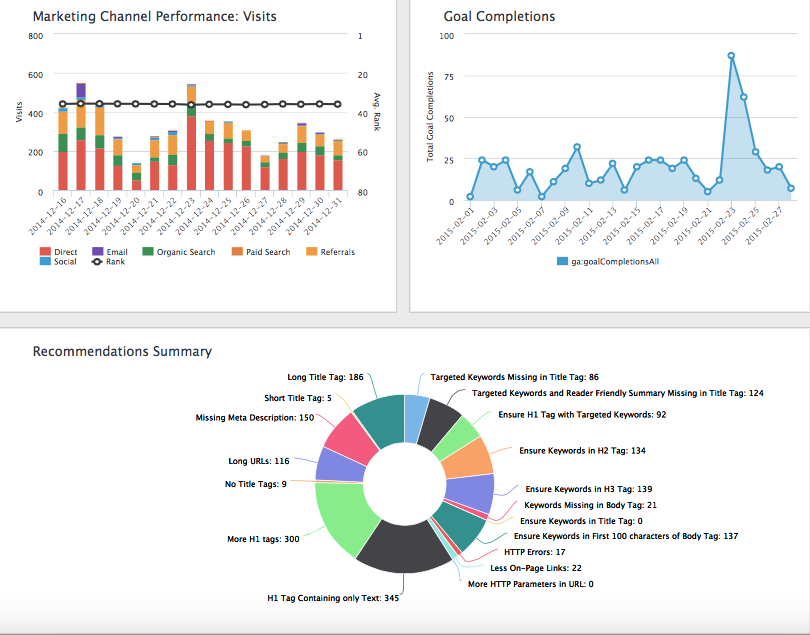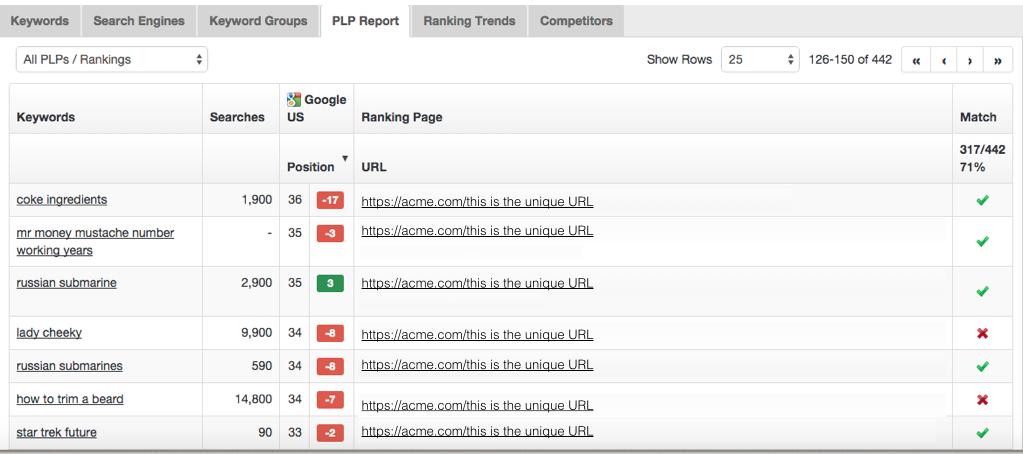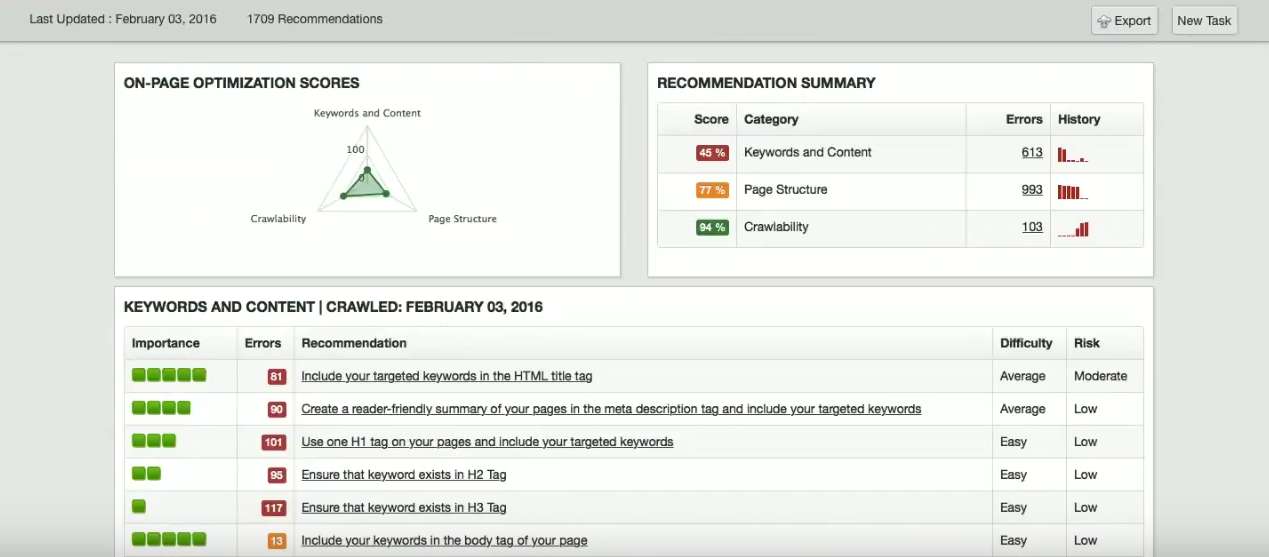The evolution of SEO and marketing functions, the changing needs of industry professionals, evolving platform technologies, and the proliferation of tools have created an atmosphere of confusion over search marketing and SEO best practices and solutions. Brands and people are asking, “Should we be using an enterprise SEO and marketing platform? And if we should, what makes up an enterprise solution and how will we use it?”
In a three-part Found Friday series, Erin Robbins, President of GinzaMetrics, addressed three key elements of the enterprise SEO and content marketing conundrum:
- What makes an SEO and marketing platform “enterprise-grade”?
- The benefits and pitfall of “all-in-one” solutions.
- Who needs an enterprise SEO and marketing platform?
What makes an SEO platform “enterprise-grade”?
There are lots of solutions available for both SEO and marketing functions. Some of the solutions focus on the SEO aspect, others on the content generation function. These days most tool providers are trying to close the gap between SEO and marketing and offer something that creates a better workflow while trying to help both functions meet and beat their greatest challenges.
“As marketing departments and professionals continue to sort out their needs based on channels, available technologies, and dynamics; platform providers have been focused not only on innovating to meet those needs, but innovating to stay on top of changes to search engines, the growing popularity of mobile devices, and the need for location specific data,” states Erin.
While there are lots of individual solutions available, larger brands, agencies, and companies who want accurate data along with insights and recommendations to improve their efforts are turning to enterprise SEO and marketing solutions. When seeking solutions, professionals and brands are often left with a choice: either choose a low-end tool that is less expensive and add in each extra features you need as you need them or invest in the enterprise solution up front. In the end, the enterprise solution can often be more cost-effective. Knowing your needs now and projecting your growth over time will help you decide the solution that’s best for you.

So, what makes a platform enterprise? We found that people are defining enterprise-grade SEO platforms in many ways. One way to identify enterprise solutions and separate them from single tool solutions is to look at the amount of data and insights the platform can provide and the overall scalability of the solution.
Based on volume and scalability, here are some elements that define an enterprise-grade solution:
- Volume or number of
- Keywords
- Including insights and deeper data
- Search engine tracking
- Locations per site
- Pages, sites, and users per account
- Competitors tracked
- Reports
- Keywords
- Data availability
- Daily versus weekly crawl data
- International tracking on universal search engines
- Local tracking data
- Local search
- Local pack
- Keyword discovery
- For you
- For your competitors
- Device level tracking and granular data
- Recommendations for improvements
- Universal search – true rank
- Integrations and organizational structure
- Granular analytics and insights
- Configurable data
- White labeling
- Account management and support levels
- Workflow and task management features
- Automated, scheduled, and customizable reporting
- Education and support materials
- API
- Integrations with analytics, CRM, CMS, other marketing tools
In this model, we define an enterprise solution by the volume of data and the depth of insights that data provides. As the chasm between SEO and content marketing is ever narrowing and the two functions rely more heavily on each other for success, enterprise platforms are beginning to be defined by not only the depth of data, but by the breadth of the types of data collected. Platforms are developing features to give brands and professionals the ability to create the most relevant content, improve overall findability, increase industry influence, and improve customer and prospect experiences in a way that doesn’t game the system.

The move toward an all-in-one solution for enterprise SEO
The synergy of SEO and content marketing has led to an evolution in SEO tools that now includes data and insights for the marketing team. The challenge for platform providers is to decide which combination of types of data should be included in all-in-one solutions, who will be using the platform, and how to create an effective workflow from one function to the others.
In Erin’s opinion, “Building a platform that does everything can interfere with your ability to continue to serve the needs of existing users and audiences. For example, if a traditional SEO platform provider added in a lot of social media engagement capabilities and content editing options, the SEO folks might feel like they’re not able to get the things they need out of the platform anymore.”
Some of the most common requests we get for combinations of an all-in-one solution include data that informs:
- Search and paid efforts
- Search and social media
- Search and content
According to Erin, “I feel like platforms delivering search insights have the best possible chances of providing really relevant content information because search data allows users to understand where audiences are searching for information, how they’re phrasing their queries, what content they’re finding, and how they’re interacting with content once they find it. I think that when we’re talking about the proliferation or change of content marketing tools, I truly believe that folks in the search and organic business have the best shot at creating something good.”

While marketers and SEOs may have an idea of some of the specific features we’d like in an enterprise SEO and marketing platform, most of us are looking to solve challenges and create an effective workflow between functions. The need to specific platform features has been replaced with the need for a platform to help us answer our toughest questions and provide solutions to our biggest challenges.
Surprisingly, the questions and challenges for SEOs and marketers haven’t changed much over the past few years. We’re still trying to find ways to improve our efforts by finding answers to questions like these:
- How does existing content perform for your audience?
- What content improvements can be made to boost findability?
- What topics are audiences already looking for, currently sharing, and talking about?
- What competing content is performing well for products, features, and topics?
- How can we create better content to beat the competition?
- How can we get SEO and marketing teams to work together effectively?
- What is an efficient and effective way to get data to people in a way that they can consume it?
- How can we assign and track tasks associated with content and SEO?
- How can we streamline reporting?
How can we predict our future successes?
While some marketers may want things like editorial calendars, content scheduling, and the ability to update content, those are not the driving forces behind the evolution of the enterprise SEO platform. Moving forward, the measure of the enterprise platform may be in the quality of the algorithms and methodologies developed by the platform providers to give users the best, most granular data despite roadblocks such as Google’s “Keyword not provided” and other algorithm changes.
Besides handling large data sets and providing insights and recommendations on what is already happening on and off the website, marketers and SEOs are looking for tools to help them forecast the future of their search efforts and recommendations for what to change.
For most platforms, forecasting is derived from inferences based on CPC, search volume, and click through rates. The biggest benefit of this type of insight is in its ability to save users time trying to make their own statistical inferences about where things should be headed. Even machine generated forecasting is based on inferences and is not an exact science. Basing decisions entirely on the forecasts provided by any platform can be dangerous. To avoid the pitfalls associated with relying too heavily on forecasts provided through your platform, look for general trends and directions indicated by the forecasts as a starting point for conversations that include other insights.
If you’re choosing a tool based on recommendations, do a little bit of research and understand how the recommendations will improve your site, audience engagement, traffic, and conversions. Although no one has a crystal ball, providers should be able to tell you what other users have experienced.

According to Erin, “To provide good recommendations and forecasts you have to have access to a lot of information and that information need to be both industry specific and site specific. While nobody has access to everything, you should know that if you spend the time and resources implementing SEO recommendations or using the forecasts as part of your strategy, your efforts will actually move the needle for your brand.”
Who needs an enterprise solution?
If you’re looking for an enterprise-grade solution to your unique challenges, you may find that your needs fall into one of these three categories:
- The need for vast amounts of data. Users in this category generally want specific search data points for a vast number of keywords, locations, or pages and plan to export that data into another platform and do analysis separately from the tool that gathers the data.
- The need for search data and insights. These users need deeper search and SEO data or content data across a variety of areas and want the platform to also conduct analysis, provide insights and recommendations. These are the users of traditional SEO tools.
- All-in-one platform People looking for an all-in-one platform may be lo0king for various combinations of data that inform organic, paid, social, and content efforts as well as recommendations, customizations, and reporting capabilities.
Regardless of what is offered, the best solution for you is the one you’ll use. When you’re looking for a solution, determine your needs and what you hope to accomplish. Then, look for a solution that helps you accomplish your goals. In short, the platform should work for you; you shouldn’t be spending your time working for the platform.
“An enterprise SEO platform is only as useful as your ability to set things up and take action based on the information once you get it. To accomplish that in the most efficient way, you’ll want a solution that allows you to organize your data into keyword and content groups, create campaigns, segment data, and get useful insights into performance,” advises Erin.
Who doesn’t need an enterprise solution?
The best enterprise SEO and marketing platforms are scalable and flexible enough to meet the needs of any size organization. Some even offer pared down versions of their platform for organization that aren’t ready to take on the price or the full functionality of an enterprise solution but still want the reliable data these platforms provide.
No matter what size platform you’re considering adopting, every tool requires some investment in time, resources, and budget. If organizational challenges will prevent you from getting the full value from your investment, maybe it’s time to step back and solve those issues before you look outside for solutions.
Some organizational challenges to be resolved before investing in an enterprise solution include:
- Too little time to use it effectively.
- Too little budget.
- Marketing organization has not yet aligned around one set of goals.
- No resources to make the recommended changes.
- The new platform doesn’t fit logically in a process of things that are truly integral to your business.
- You don’t know what challenges you want a platform to help you solve.
Before you decide whether or not you need an enterprise SEO and marketing platform, take the time to do a little soul searching. Knowing what you’re trying to accomplish, the challenges you want to overcome, the overall corporate goals, and how your efforts will contribute to those goals will help focus your efforts as you sort through the tools to find a solution to your unique challenges.
If you’re ready to start using an enterprise SEO and marketing platform or you’re ready to switch platforms, give us a shout and we’ll show you how we approach SEO and marketing solutions.

